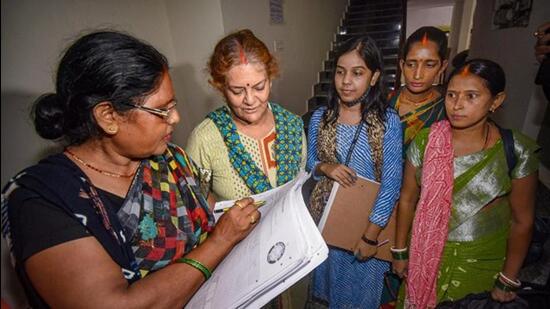Caste count: BJP, Congress spar in Rajasthan, experts expect class churn
Political analyst said that the caste census will deepen caste consciousness in society, which will gradually evolve into a broader class-based structure
Jaipur: The union cabinet’s approval to include caste enumeration in the upcoming general census has triggered a fierce political contest between the Bharatiya Janata Party (BJP) and Congress, with experts viewing it as a potential turning point in India’s socio-political landscape.

While Congress veteran Ashok Gehlot credited the move to party leader Rahul Gandhi’s sustained pressure and framed it as a step toward long-overdue social justice, BJP leader and Rajasthan state president Madan Rathore welcomed the decision but accused the Congress of politicising the issue for electoral gain.
Amid the political sparring, experts like political analyst Narayan Bareth and legal voice Satyendra Raghav say the caste census could deepen caste consciousness initially, but ultimately pave the way for a class-based political realignment that could challenge entrenched hierarchies in society and redefines representation in governance.
Former Rajasthan chief minister Gehlot said the government was compelled to agree to a caste census under pressure from Leader of the Opposition in the Lok Sabha, Gandhi.
“They (BJP and RSS) used to allege that Congress is trying to divide the society when we raised the demand for a caste census. But now they caved in under pressure,” Gehlot said. As CM, Gehlot did not get any caste survey done in Rajasthan even though Gandhi was raising the issue.
Also Read:What is caste census, Modi govt’s big announcement?
“It is an important decision. If after 75 years, scheduled castes (SC), scheduled tribes (ST), other backward classes (OBCs) feel they have not got justice then how long will they remain silent. It should be done in a scientific manner,” he said.
He said the government should clarify when the census will start, how it will take place and how long it will take. He also supported Gandhi’s call for removal on the 50% cap on reservations.
“Telangana has done a caste survey, which can be a model for the centre to study and replicate,” he said.
Welcoming the government decision, Rathore said this shows the government’s committment to the values and interests of the society and the country.
He added that the Congress had historically opposed the caste census.
“If the caste enumeration is done along with the general census, it will not put any burden. Only one column has to be added in the census form to note down the caste. The Congress on the other hand was pressing exclusively for a caste census that would put a lot of financial burden on the government… Congress and its allies were pressing for the caste census only to use it as a political tool,” he said.
Also Read:Next census will include caste enumeration: Govt
Rathore said, “Late prime minister Manmohan Singh had in 2010 assured the Lok Sabha that the matter of caste census would be taken up for consideration in the cabinet… a ministerial committee was also formed. But in the end the Congress only did a survey that is known as Socio Economic and Caste Census.”
Analyst Bareth said that the caste census will deepen caste consciousness in society, which will gradually evolve into a broader class-based structure.
“Politically, it will influence voting patterns, leading to a clearer division between forward and backward communities,” he said.
Bareth emphasised that over time, people’s thinking will shift from caste lines to class lines, which will strengthen the framework of social justice. “A new and larger political pattern will emerge, driven by class consciousness,” he added.
He said that this shift could trigger a collective struggle among marginalized groups. “India has over 3,000 castes and 25,000 sub-castes. This diversity will create a new churn in society, leading to the formation of new caste alliances and a dynamic political realignment.”
Also Read:Annihilating caste in universities and colleges
Former additional advocate general Satyendra Raghav said that the caste census will bring sidelined communities into the mainstream and provide them with a new sense of direction. “There are several communities that currently do not have representation even at the level of government officers. The dominance of a few castes will be re-evaluated, and opportunities will become more inclusive,” he said.
Raghav emphasised that the Constitution mandates benefits should reach the truly deserving. “If one community has already availed its fair share through reservations, then the opportunity should be extended to others in need,” he added.





